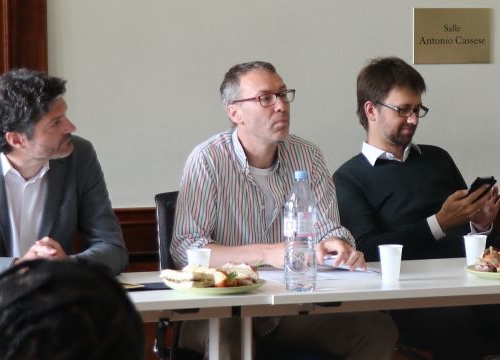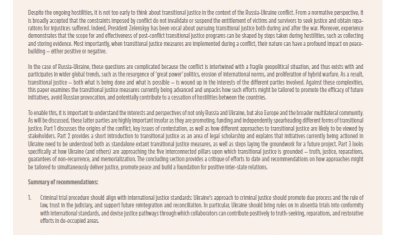Preparing for a Career in Transitional Justice


Geneva Academy
12 June 2018
Students of our Master of Advanced Studies in Transitional Justice, Human Rights and the Rule of Law (MTJ) had the opportunity to meet leading practitioners to discuss various career paths in the field of transitional justice.
During a dedicated session, they discussed thematic work in the field of transitional justice, how to start a career, career opportunities and skill required for the field.
There was a consensus that the field is growing and that there are more jobs today than there were 15 years ago. Challenges, such as high competition in the application process, how to get first field experience and legal barriers for students from the global south to work in Europe were also debated, with practitioners providing guidance and sharing their own experiences.
Career Paths in Transitional Justice
Philip Grant, Director of Trial International, Katia Papagianni, Director for Policy and Mediation Support at the Center for Humanitarian Dialogue, Samuel Emonet, Director of Operations at Justice Rapid Reponse, Victoria Kuhn, Advisor to the UN Special Rapporteur on Transitional Justice at the Office of the United Nations High Commissioner for Human Rights and Oliver Jütersonke, Head of Research at the Center on Conflict, Development and Peacebuilding shared with students their daily work and responsibilities, career path as well as tips and practical advice on how to start working in the field of transitional justice, human rights and the rule of law.
‘These discussions with professionals coming from different backgrounds and working for international organizations, NGOs or academic institutions provide our students with a very good insight into a career path in the field of transitional justice and therefore allows them to better choose their career path after the completion of our master’ underlines Thomas Unger, co-director of the MTJ.
‘I met with highly motivated and talented students and I look forward seeing them working in the field of transitional justice and international justice. We need such well-trained professionals to join us in the fight against impunity and in supporting victims in their quest for justice’ stresses Philip Grant.
‘Beyond Geneva-based organizations, there are many local NGOs and grassroots initiatives that are also offering internship opportunities and short-term field postings. This gives young professionals a first-hand experience and allows them to address concrete transitional justice and human rights issues’ adds Oliver Jütersonke.
‘The international human rights and humanitarian field is expanding, as more organizations are being formed and existing organizations grow. It is a good time for young people to enter the field and make a contribution to the field’ says Katia Papagianni.

Developing our Students’ Network
Throughout the year, the MTJ puts specific emphasis in providing students with real-world perspectives and in allowing them to develop their networks. This career session, along with other activities, fits into this objective.
‘These exchanges allow our students to develop their network and learn about various transitional justice jobs and career opportunities’ underlines Frank Haldemann, co-director of the MTJ.
‘Getting to meet actors and experts working in the field of transitional justice was a very good opportunity to learn from their experiences: it was encouraging to understand the reasons that guided them to commit themselves to human rights protection’ underlines Irene Izquieta, currently enrolled in the MTJ. ‘Listening to them and their life stories gave me a chance to think and reflect on my own path and what has inspired me to dedicate my life to this field’ she adds.
‘Having an exchange with transitional justice practitioners was very inspiring: they shared their experiences with us and told us why they decided to go for the path of the defence of human rights’ stresses Mary Diaz Marquez, currently enrolled in the MTJ. ‘They also encouraged us to keep on going despite the obstacles that come up our way: it was a great way of helping us to prepare for what is coming ahead’.






